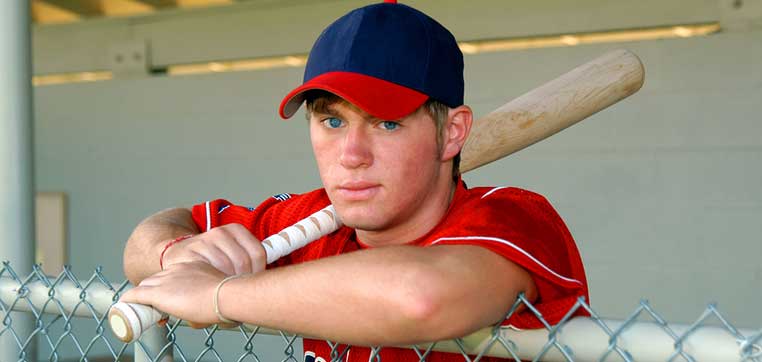 It seems that weekly, if not daily, you’ll come across another story about how today’s generation has been coddled with self-esteem trophies since their first little league game and have been told that their clay pots are special no matter how lumpy and cracked. This has an especially insidious strain in high school sports that can undermine a player’s chances to get recruited to play college baseball.
It seems that weekly, if not daily, you’ll come across another story about how today’s generation has been coddled with self-esteem trophies since their first little league game and have been told that their clay pots are special no matter how lumpy and cracked. This has an especially insidious strain in high school sports that can undermine a player’s chances to get recruited to play college baseball.
Think about it, combine the me generation with a standout high school athlete and the too often accompanying egotism, you get a package of entitlement that will keep even the best players off a college baseball team.
It’s the “you’re good enough that you don’t have to” perspective that fails to recognize the reality of the situation. And unfortunately, today’s parents often contribute to the problem. The reality is that if you want to get recruited to play college baseball, you need to get over thinking that you’re good enough that you don’t have to…
…worry about being recruited.
Your stats are so outstanding, so far off the scale compared to everyone else, that the coaches will be coming to you. If this is the case for you and you’ve been listed as a national blue-chip prospect for the past year or two, congratulations, you’ve been discovered.
For everyone else, if you want to get recruited to play college baseball, it’s a matter of numbers. The thing to remember is that ultimately it’s the college coaches that get to do the picking. Given all of the other players who are going out of their way to put themselves in front of the coaches with stats just as good as yours, why should they have to go through the trouble to find you?
Then there is the fact that most coaches have limited opportunities to recruit outside their region. If you want to expand your chances to get recruited to play college baseball, you need to find out how to get in front of coaches who may have never heard of your high school or don’t follow your state tournament.
Let’s not forget about the transfer portal. The number of players entering the transfer portal is likely only to increase. These players are appealing to coaches because they’ll have college level, verifiable stats who can make immediate contributions to the team. This means that high school players will need to make sure they’ve researched their college options carefully and provided coaches with the chance to watch them live at a camp or tournament whenever possible
…worry about academics.
Unless you’re up for the draft, you have to worry about grades even if the testing requirements are going away. Why? Because the coaches have to. They have to follow the rules so why bother with an athlete that he’ll have to worry about making the grades?
The really sad thing is that families will start paying for lessons for a ten-year old but won’t worry about grades until the kid is a senior. Unfortunately, too many high school players don’t realize that they are required to take a specific number of acceptable courses each year. If you find out your junior year that you’re missing a couple of classes, it may not be possible to make up the classes because of the time to graduation. You should check as soon as possible as to which courses are acceptable to the NCAA.
And try to go beyond the minimum requirements. Better academic qualifications will expand the number of colleges where the athlete can get recruited to play college baseball. Remember, conferences and colleges can and do set their own standards.
Furthermore, it’s not just about meeting minimum academic qualifications. Athletes can qualify for academic scholarships which may be the difference between being able to afford to play at the D3 level that doesn’t allow athletic scholarships. Then there’s the coaches who would prefer to recruit a player that will qualify for some academic money and allow him to save some of athletic scholarship money for other players.
…worry about attitude.
You know nobody plays your position better than you so don’t have to hustle onto the field. Since you’re such a great hitter, you’re expected to throw your helmet in the dugout if you strike out. Right?
Wrong. If a college coach is recruiting someone of your athletic abilities, he isn’t recruiting you to be the star of the team. He’s recruiting you because your skills match those on the team. That means everyone else on the team will be at least as good as you and the last thing a coach needs is a team full of prima donnas. (Click HERE for the College Recruiting Toolkit which includes a list of questions to ask coaches.)
Attitude is the one thing players have complete control over. Coaches know this. Players need to demonstrate this every chance they get.
…worry about paying for college.
After all, you’re going to get a full-ride scholarship. Not likely. There are only 11.7 scholarships for a D1 baseball team. That’s the entire team. Furthermore, not all schools fully fund their scholarships and scholarships are often awarded a year at a time. And what if you get hurt? Using the Expected Family Contribution (soon to be Student Aid Index) and College Net Price Calculators is a smart thing to do.
The NCAA division with the most baseball teams is D3 and as mentioned earlier, D3 doesn’t give out athletic scholarships. There are also a lot more private D3 colleges than public ones. Start paying attention to merit scholarships early. You can’t play college baseball if you can’t afford to attend college.



2 thoughts on “What High School Baseball Players Need to Worry About to be Recruited by Colleges”